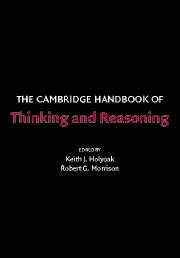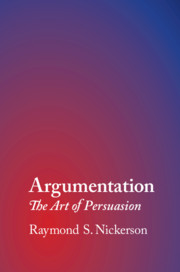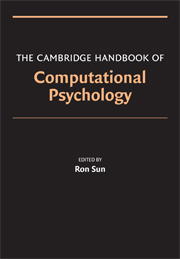The Cambridge Handbook of Thinking and Reasoning
Part of Cambridge Handbooks in Psychology
- Editors:
- Keith J. Holyoak, University of California, Los Angeles
- Robert G. Morrison, University of California, Los Angeles
- Date Published: July 2005
- availability: Available
- format: Paperback
- isbn: 9780521531016
-
The Cambridge Handbook of Thinking and Reasoning is a comprehensive and authoritative 2005 handbook covering all the core topics of the field of thinking and reasoning. Written by the foremost experts from cognitive psychology, cognitive science, and cognitive neuroscience, individual chapters summarize basic concepts and findings for a major topic, sketch its history, and give a sense of the directions in which research is currently heading. The volume also includes work related to developmental, social and clinical psychology, philosophy, economics, artificial intelligence, linguistics, education, law, and medicine. Scholars and students in all these fields and others will find this to be a valuable collection.
Read more- First handbook to cover all core topics in the field of thinking and reasoning
- Written by foremost experts from cognitive psychology, cognitive science and cognitive neuroscience
- Chapters integrated with cross-citations
Customer reviews
Not yet reviewed
Be the first to review
Review was not posted due to profanity
×Product details
- Date Published: July 2005
- format: Paperback
- isbn: 9780521531016
- length: 874 pages
- dimensions: 252 x 180 x 40 mm
- weight: 1.48kg
- contains: 82 b/w illus. 2 maps 18 tables
- availability: Available
Table of Contents
Preface
Part I. The Nature of Human Concepts:
1. Thinking and reasoning: a reader's guide Keith J. Holyoak and Robert G. Morrison
2. Similarity Robert l. Goldstone and Ji Yun Son
3. Concepts and categories: memory, meaning, and metaphysics Douglas L. Medin and Lance J. Rips
4. Approaches to modeling human mental representations: what works, what doesn't and why Leonidas A. A. Doumas and John E. Hummel
Part II. Reasoning:
5. The problem of induction Steven A. Sloman and David A. Lagnado
6. Analogy Keith J. Holyoak
7. Causal learning Marc J. Buehner and Patricia W. Cheng
8. Deductive reasoning Jonathan St. B. T. Evans
9. Mental models and thought P. N. Johnson-Laird
10. Visuospatial reasoning Barbara Tversky
Part III. Judgment and Decision Making:
11. Decision making Robyn A. LeBoeuf and Eldar Shafir
12. A model of heuristic judgment Daniel Kahneman and Shane Frederick
13. Motivated thinking Daniel C. Molden and E. Tory Higgins
Part IV. Problem Solving and Complex Learning:
14. Problem solving Laura R. Novick and Miriam Bassok
15. Creativity Robert J. Sternberg, Todd I. Lubart, James C. Kaufman and Jean E. Pretz
16. Complex declarative learning Michelene T. H. Chi and Stellan Ohlsson
17. Thinking as a production system Marsha C. Lovett and John R. Anderson
18. Implicit cognition and thought Leib Litman and Arthur S. Reber
Part V. Cognitive and Neural Constraints on Human Thought:
19. Thinking in working memory Robert G. Morrison
20. Cognitive neuroscience of deductive reasoning Vinod Goel
21. Cognitive and neuroscience aspects of thought disorder Peter Bachman and Tyrone D. Cannon
Part VI. Ontogeny, Phylogeny, Language, and Culture:
22. Development of thinking Graeme S. Halford
23. Mathematical thinking Randy Gallistel and Rochel Gelman
24. Effects of aging on reasoning Timothy A. Salthouse
25. Reasoning and thinking in nonhuman primates Josep Call and Michael Tomasello
26. Language and thought Lila Gleitman and Anna Papafragou
27. Paradigms of cultural thought Patricia M. Greenfield
Part VII. Thinking in Practice:
28. Legal reasoning Phoebe C. Ellsworth
29. Scientific thinking and reasoning Kevin Dunbar and Jonathan Fugelsang
30. Reasoning in medicine Vimla L. Patel, Jose F. Arocha and Jiajie Zhang
31. Intelligence Robert J. Sternberg
32. Learning to think: the challenges of teaching thinking Ron Ritchhart and David N. Perkins.
Sorry, this resource is locked
Please register or sign in to request access. If you are having problems accessing these resources please email [email protected]
Register Sign in» Proceed
You are now leaving the Cambridge University Press website. Your eBook purchase and download will be completed by our partner www.ebooks.com. Please see the permission section of the www.ebooks.com catalogue page for details of the print & copy limits on our eBooks.
Continue ×Are you sure you want to delete your account?
This cannot be undone.
Thank you for your feedback which will help us improve our service.
If you requested a response, we will make sure to get back to you shortly.
×



